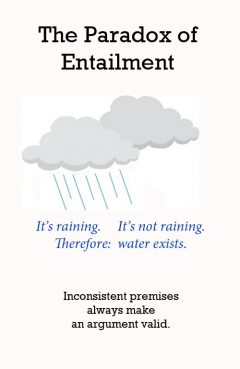The Paradox of Entailment

Release Date: //
Country of Release:
Length:
MPAA:
Medium: Paradox
Genre:
Release Message: Inconsistent premises always make an argument valid.
Description: The paradoxes of material implication are a group of formulae which are truths of classical logic, but which are intuitively problematic. One of these paradoxes is the paradox of entailment. The root of the paradoxes lies in a mismatch between the interpretation of the validity of logical implication in natural language, and its formal interpretation in classical logic, dating back to George Boole's algebraic logic. In classical logic, implication describes conditional if-then statements using a truth-functional interpretation, i.e. "p implies q" is defined to be "it is not the case that p is true and q false". Also, "p implies q" is equivalent to "p is false or q is true". For example, "if it is raining, then I will bring an umbrella", is equivalent to "it is not raining, or I will bring an umbrella, or both". This truth-functional interpretation of implication is called material implication or material conditional.